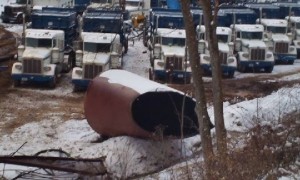WV Legislators Working to Roll Back Above-ground Tank Regulations
From an Article by Glynis Board, WV Public Broadcasting, February 26, 2015
State senators in Charleston took action this week to roll back aboveground tank regulations put in place after last year’s chemical spill which contaminated water for hundreds of thousands of West Virginians.
The Senate Judiciary committee passed an amended bill that would make major changes to the Above Ground Storage Tank Act that was passed into law in the wake of last year’s chemical spill into the Elk River.
More than 50,000 tanks are currently registered with the state Department of Environmental Protection under the law, but a vast majority of those would be pulled from the agency’s regulatory program should the Senate’s bill pass.
Zones of Critical Concern
Instead of regulating all above ground tanks in the state, and despite the fact that the WV-DEP has already gone through a year-long rulemaking process, Judiciary chair Charles Trump explains that the amended version of Senate Bill 423 focuses on the tanks located in “zones of critical concern.” He says much of the WV-DEP’s work will be salvageable.
“The bill establishes two levels of tanks that would get scrutiny. Level one tanks are those which contain 50,000 gallons of anything, tanks that contain really bad or dangerous stuff in them, and all tanks which are in the zone of critical concern.”
Trump explains that zones of critical concern are identified as anything that could flow to a water intake within five hours. Level two tanks are those that would take 5 to 10 hours to flow to a water intake.
President of the environmental consulting firm Downstream Strategies, Evan Hansen explains that prior to the amendments, the bill would have deregulated all but about 100 of the 50-thousand tanks currently registered – three quarters of which are classified as oil and gas storage tanks.
“The bill is different from what was originally introduced,” Hansen said, “but I wouldn’t call this a ‘compromise’. It’s still a significant rollback from current law.”
Opting Out
The amended bill would leave approximately 12,000 tanks regulated, and of those, Hansen explained, the owners and operators would have the option of applying to the Department of Environmental Protection to be regulated under other existing programs.
So in effect, Hansen says, the end result would likely be very similar to the bill that was initially introduced, leaving perhaps a hundred tanks regulated.
Department of Environmental Protection Secretary Randy Huffman spoke to the Judiciary Committee in support of proposed changes as did the president of the West Virginia Oil and Gas Association, Corky Demarco. And there seems to be a general bipartisan consensus of approval among senators. Mike Romano is a Democrat from Harrison Country who speaks highly of the bill saying that it corrects overreaches.
“We gotta remember,” Romano said, “that we’ve had one tank spill in the history of our state that the DEP was able to identify, and that was Freedom.” But some remember other tank spills.
Lisby Pad Explosion
“Those who forget history have a propensity to repeat it,” said Wetzel County resident Bill Hughes. Smaller communities deserve the same protections as larger ones, Hughes said, and he worries the regulatory rollback will leave communities that are inundated by the natural gas industry exposed.
“The town of Pine Grove, in Wetzel County, and the town of Middlebourne in Tyler County have sole source surface water drinking supplies. Meaning, one stream is the only place they get their drinking water and they’re both very vulnerable.”
In January of last year the WV-DEP was called to Tyler County just six miles from Middlebourne where one of six 8-thousand-gallon steel tanks exploded and caused “a black sludge to flood an area around a well pad,” according to a local report two weeks later in the Tyler Star News. The WV-DEP “found there was imminent danger by causing a fresh water supply to be lost or contaminated.”
Hughes says it was four days of rain washing the contamination into the stream only a few feet away before any state agency responded. No one told the town of Middlebourne about the explosion or that their water was contaminated during that time.
“The local gas operator folks, they don’t even know that this could be a water source for a downstream municipality. They’re not from around here,” Hughes added.
Weakened Regulations
Meanwhile, back in Charleston, environmental consultant Evan Hansen says discussion on Senate Bill 423 has been dominated by debate over which tanks should or should not be regulated; but Hansen is worried that the bill would also substantially reduce the stringency of regulation.
“For example, it significantly cuts down on the frequency of inspections that are required by the DEP, it significantly weakens the self-inspections that are required to be done by the owners and operators, it cuts down on the provision of information to water utilities that are trying to do planning to protect their source water and it takes several other steps that weaken the Act.”
Senate Bill 423 now moves to the floor for the full Senate’s consideration. The companion bill in the House has not been taken up by a committee.
See also: www.FrackCheckWV.net

